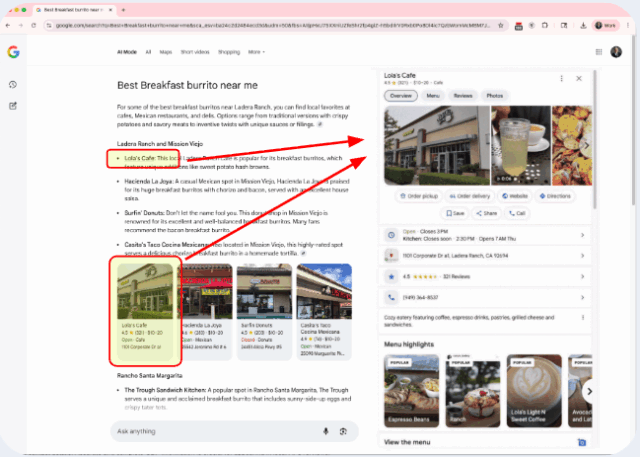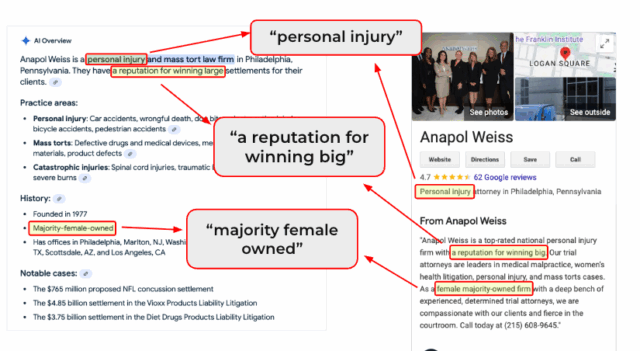Search is changing, and if you work in local SEO, you’ve probably already felt it. Maybe your clients are reporting fewer clicks to their websites. Maybe you’re seeing impressions climb (before Google’s parameter changes at least), but conversions stall. The shift is real, and it’s being driven by Google’s evolution from a search engine to an answer engine.
I recently spoke at BrightonSEO San Diego, where I shared my experience from working at Google and my years helping clients improve their Google Business Profile’s performance. I explained why this shift matters and what local marketers should do about it. Here’s a breakdown of the key takeaways.
From Links to Answers
For over two decades, Google has been a gateway to the web. Searchers typed in a query and were served 10 blue links. But that model is quickly becoming outdated.
Enter AI Overviews (previously known as Search Generative Experience or SGE). These AI-generated summaries sit atop the search results, answering questions directly on the page without requiring users to click through. And it’s happening a lot more than you might think:
- 88% of informational queries now trigger an AI Overview (Source: SEMrush)
- 40%+ of local business queries are beginning to do the same (Source: LocalFalcon)
- And a staggering 69% of all searches end without a single click (Source: Similarweb)
This has massive implications. Google is no longer just curating information; it’s synthesizing it. And in doing so, it’s reshaping how consumers discover and engage with local businesses.
Your Website Isn’t Dead, But It’s Not Where the Action Starts
Let’s be clear. Your business’s website still matters. It’s a key source of structured content that Google uses to inform its large language models (LLMs) like Gemini. But when it comes to local queries, the most critical piece of your online presence is now your Google Business Profile (GBP).
Why? Because that’s what powers the Knowledge Panel, and the Knowledge Panel is fast becoming the place where decisions are made.
Whether in AI Mode or traditional search, users are increasingly interacting with the GBP interface, not your website. Clicking on the business name or image doesn’t take users to the site. It opens the GBP directly in the search results. Even photos and videos are rendered right there in the panel.

As the image above shows, clicking on the links in AI Mode will open the business knowledge panel instead of taking you to the business website.
This means your Google Business Profile isn’t just a listing anymore. It’s your new homepage.
What Local Marketers Should Do Right Now
So how do you adapt? Here are six actionable steps to future-proof your clients’ visibility in a world dominated by AI and zero-click experiences:
1. Optimize Descriptions and Services with Intent
Your Google Business Profile description and service list are no longer just for users. They’re data sources for Google’s AI.
Use clear, keyword-rich language that mirrors the way people ask questions. For example, if you’re a family law firm, don’t just say “We offer legal services.” Say, “We help with divorce filings, child custody, and adoption cases in [City Name].”
Inject your unique selling points and highlight anything that might resonate with search intent.
2. Choose the Most Specific Primary Category
This one’s easy to overlook, but it’s arguably the most impactful change you can make. Don’t settle for generic categories like “Lawyer” or “Store.” Go specific: “Personal Injury Attorney” or “Mexican Restaurant” gives Google a much clearer signal about what you do.
Once you’ve nailed the primary category, add relevant secondary categories. Avoid anything that doesn’t directly relate to your services. Irrelevant categories can dilute your authority and confuse the algorithm.
3. Reviews: Prioritize Frequency, not Just Volume
Yes, you need a lot of reviews. But you also need them to be frequent, relevant, and full of keywords.
Google’s AI models now extract intent and attributes from review content. So a review that says, “Best place for emergency dental work in Tampa!” is more valuable than one that says simply, “Great service.” Encourage customers to be specific and include photos whenever possible.
4. Complete Every Section of Your Profile
Google rewards data-rich profiles. Fill out every attribute, even if the answer is “No.” For instance, if a business isn’t woman-owned, still mark that attribute as “No” rather than leaving it blank. A complete profile sends trust signals and helps the AI understand your business more confidently.
Consistency matters too. Make sure your business name, address, and phone number (NAP) match exactly across your website, GBP, and directories.
5. Use Real Photos and Videos and Update Them Often
AI is now scanning visual content, not just metadata. That means every image or video you upload is another opportunity to confirm your relevance, authenticity, and location.
Showcase interior and exterior shots, team members in action, and real customers (with permission). Avoid stock photography or AI-generated images. They’re easily flagged and less trusted by the algorithm.
6. Post Regularly to Influence Conversions
Google Posts might not boost rankings, but they do improve conversions. Treat them like digital signage. Promote seasonal offers, share news, or highlight unique services.
Since users are now engaging more with your GBP than your website, this is your chance to shape their perception and nudge them toward action, whether that’s a call, a direction request, or a visit.
Proof That It Works
We’ve tested these strategies and seen the AI Overview directly reference GBP content. Descriptions like “a reputation for winning big” and “majority female-owned” came straight from a business profile and were echoed verbatim in the AI’s response. That’s not a coincidence. That’s influence.

The Big Takeaway
Google is no longer just a search engine. It’s an answer engine. And the businesses that win in this environment are the ones who feed the machine with the best, most relevant, and most complete data.
In this new world, your Google Business Profile is the most important source of local business data for Google AI.
It’s a living, breathing representation of your business, and it might be the only thing a customer sees before they decide to call, visit, or move on.
So optimize it like your business depends on it.
Because increasingly, it does.

